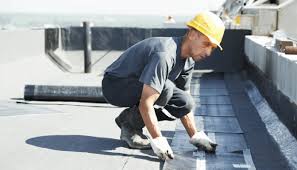Roof Waterproofing Specialist
When it comes to maintaining the structural integrity of a building, roof waterproofing is a crucial component that cannot be overlooked. As a team of dedicated roof waterproofing specialist, we understand the importance of safeguarding your property from water damage, which can lead to significant structural issues and costly repairs. This comprehensive guide aims to delve into the various aspects of roof waterproofing, emphasizing why professional expertise is essential in achieving long-lasting and effective results.
Understanding Roof Waterproofing
What is Roof Waterproofing?
Roof waterproofing is the process of applying a protective layer or membrane to the roof surface to prevent water infiltration. This is essential in protecting the roof structure and the interior of the building from water damage, mold growth, and structural deterioration. Waterproofing materials create an impermeable barrier that ensures water does not seep through the roof, thereby enhancing the durability and lifespan of the roofing system.
Importance of Roof Waterproofing
Water damage can be detrimental to the integrity of a building. It can lead to issues such as:
- Structural Weakening: Prolonged water exposure can weaken the roof structure, leading to sagging or collapse.
- Mold and Mildew Growth: Moist environments are breeding grounds for mold and mildew, which can pose health risks to occupants.
- Insulation Damage: Water infiltration can compromise the effectiveness of insulation, leading to energy inefficiency and increased utility bills.
- Interior Damage: Water stains, peeling paint, and damaged ceilings are common consequences of roof leaks.
Types of Roof Waterproofing Systems
Liquid Waterproofing Membrane
One of the most versatile and commonly used methods is the liquid waterproofing membrane. This involves the application of a liquid coating that cures to form a seamless, rubber-like membrane. It is highly effective in sealing cracks and gaps, providing a durable and flexible waterproof barrier.
Bituminous Membrane
Bituminous waterproofing is another popular method, particularly for flat roofs. This system uses bitumen-based materials, such as asphalt or coal tar, which are applied as sheets or liquid. Bituminous membranes are known for their durability, UV resistance, and ability to withstand harsh weather conditions.
Polyurethane Waterproofing
Polyurethane is a highly elastic waterproofing material that is ideal for flat roofs and surfaces with high exposure to the elements. It provides excellent adhesion and resistance to weathering, making it a reliable choice for long-term waterproofing.
EPDM Rubber Roofing
EPDM (ethylene propylene diene monomer) is a synthetic rubber roofing membrane known for its exceptional durability and flexibility. It is highly resistant to UV rays, ozone, and extreme temperatures, making it an excellent choice for both residential and commercial roofing systems.
Steps in Roof Waterproofing Process
Inspection and Preparation
Before applying any waterproofing solution, a thorough inspection of the roof is essential. This involves identifying existing damage, potential leak points, and areas requiring repair. Proper surface preparation, including cleaning and priming, ensures optimal adhesion and effectiveness of the waterproofing material.
Application of Waterproofing Material
The next step is the application of the chosen waterproofing material. Depending on the system, this may involve:
- Liquid Application: Applying the liquid waterproofing membrane using brushes, rollers, or spray equipment.
- Sheet Installation: Laying down bituminous sheets or EPDM membranes, ensuring they are securely adhered and seams are properly sealed.
Curing and Drying
Allowing adequate time for the waterproofing material to cure and dry is crucial for achieving maximum effectiveness. This period varies depending on the material used and environmental conditions.
Final Inspection and Maintenance
A final inspection ensures that the waterproofing has been applied correctly and is functioning as intended. Regular maintenance checks and prompt repairs of any damage or wear can extend the lifespan of the waterproofing system and the roof itself.
Benefits of Professional Roof Waterproofing Services
Expertise and Experience
As seasoned roof waterproofing specialists, we bring years of experience and in-depth knowledge to every project. Our expertise allows us to select the most suitable materials and techniques for each unique roofing situation, ensuring optimal results.
Quality Materials
We use only high-quality, industry-approved waterproofing materials that provide superior protection and longevity. Our commitment to quality ensures that your roof remains waterproof and resilient for years to come.
Customized Solutions
Every roof is different, and we understand the importance of providing customized waterproofing solutions tailored to your specific needs. Whether it’s a residential property or a commercial building, we design and implement waterproofing systems that address your particular requirements.
Cost-Effectiveness
Investing in professional roof waterproofing services can save you money in the long run by preventing costly repairs and structural damage. Our efficient and effective waterproofing solutions offer excellent value for money, protecting your investment.
Common Roof Waterproofing Issues and Solutions
Leaks and Seepage
Leaks are the most common issue addressed by waterproofing. Identifying the source of the leak is critical, as water can travel along the roof structure, making pinpointing the exact location challenging. Professional inspection and targeted repairs are necessary to resolve leaks effectively.
Ponding Water
Flat roofs are particularly susceptible to ponding water, where water accumulates in low spots. This can lead to membrane deterioration and leaks. Proper slope design and drainage systems are essential in preventing ponding and maintaining a waterproof roof.
Cracks and Blisters
Over time, roofing materials can develop cracks and blisters due to thermal expansion, contraction, and aging. Regular inspections and timely repairs using suitable waterproofing compounds can address these issues before they escalate.
UV Damage
Exposure to UV rays can degrade some waterproofing materials, leading to reduced effectiveness. UV-resistant coatings and membranes are essential in prolonging the life of the waterproofing system and maintaining its protective properties.
Why Choose Us as Your Roof Waterproofing Specialists
Comprehensive Services
We offer a full range of roof waterproofing services, from initial inspection and consultation to complete installation and maintenance. Our comprehensive approach ensures that all aspects of your roof’s waterproofing needs are addressed.
Customer Satisfaction
Our primary goal is customer satisfaction. We work closely with our clients to understand their needs and provide solutions that exceed expectations. Our commitment to quality workmanship and excellent service has earned us a reputation as a trusted roof waterproofing specialist.
Advanced Techniques
We stay updated with the latest advancements in waterproofing technology and techniques. Our use of modern equipment and innovative methods ensures that we deliver top-notch results efficiently and effectively.
Reliable and Trustworthy
Our clients trust us for our reliability and professionalism. We pride ourselves on delivering projects on time and within budget, with a focus on safety and quality.
Conclusion
Roof waterproofing is an essential investment in protecting the structural integrity and longevity of your property. By choosing professional roof waterproofing specialists, you ensure that your roof is equipped to withstand the elements and prevent water damage. Our expertise, high-quality materials, and customized solutions make us the ideal choice for all your roof waterproofing needs.





